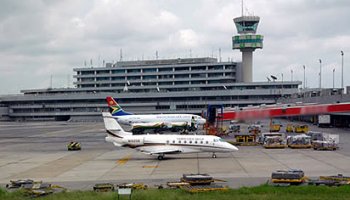The Airline Operators of Nigeria (AON) has lamented the reintroduction of fresh government duties on imported spare parts for aircrafts by the Nigeria Customs Service (NCS), saying that private airlines would have suspended flying indefinitely last week owing to unfavourable business environment.
He specifically noted that even before the outbreak of COVID-19, airlines in Nigeria have been going through turbulent times, adding that over 50 of them have folded up in the last three decades because government policies were never friendly to the sector.
Vice president of AON, Allen Onyema, made the disclosures when executive members of the group paid a courtesy visit to the Senate President, Ahmad Lawan, at the National Assembly on Thursday.
The AON executives were led to the office of the Senate President by the Aviation Minister, Hadi Sirika.
According to Onyema, who also is the Chairman of Air Peace, the return of high duties on imported parts has made it impossible for airlines to undertake clearance of aircraft parts at sea ports and cargo sheds, a situation which poses a risk on the safety of air passengers.
He, therefore, appealed to the Senate to incorporate President Muhammadu Buhari’s duty waiver on commercial aircrafts and spare parts into the Finance Bill, 2020 presently before the National Assembly.
“Mr. President, it is not something to be proud of, that in the last thirty years of our lives as a nation, over 50 airlines have gone down. The owners of these airlines succeeded in other business, why have they failed in aviation?
“It could be traced to so many factors, including corporate governance, but most importantly policies. The policies have not been friendly to the growth of aviation.
“The President of this country, Muhammadu Buhari, in his wisdom and avowed determination to encourage indigenous businesses in this country, decided to grant zero duty to airlines for the importation of commercial aircrafts and spare parts.
“He equally granted waivers to airlines fo imitation of aircrafts or aircraft soared. In the last six years, this has helped airlines in Nigeria.
“However, just recently this year, the Customs decided to reintroduce it, even when Mr. President has not revoked his presidential order taken at the Federal Executive Council. They’ve introduced a clearing that is alien to aviation.
“Mr. President, Sir, I would like to intimate you, that this particular regime to reintroduce what Mr. President has granted us has made airlines to be groaning.
“Many of these airlines have their spare parts at the sea ports and cargo sheds not being cleared because we don’t have that money to clear them. And we can never endanger the lives of people in this country by flying aircrafts that are unsafe.
“The Finance Bill is today before the Senate. We will like the intention and will of Mr. President to be incorporated in that Finance Bill, so that it will never be be at the whims and caprices of whoever takes over some certain government agencies going forward.
“All over the world, this is what is happening, Nigeria cannot be an exception.
“To be honest with you, all the airlines wanted to shut down last week indefinitely, but for the intervention of the Honourable Minister of Aviation, because we cannot continue with this.
“We are borrowing money with interest at 26 percent, now the interest rate has come down to 15 percent, which is still very high. We can’t even get forex to do our business. Everything about aviation is imported,” Onyema lamented.
Responding, President of the Senate, Ahmad Lawan, has assured the airline operators that the National Assembly will ensure that the Aviation sector is protected and supported.
Lawan said for private investors in the country’s aviation industry to survive, government policies must be fine-tuned in a way to ensure they thrive.
The Senate President, who pledged the support of the National Assembly towards ensuring that airline operators are not squeezed out of business, said the legislature would look into policies affecting the sector while taking into consideration government’s need for revenue generation.
“The policies of government at all times should be in tandem to make life better for citizens particularly, and support businesses to grow.
“The aviation industry of course is no exception. Government policies should always be targeted at ensuring this industry prospers.”
“I followed the drafting of the FIRS bill particularly, and the aviation sector was missed. We will find out why it was not included.
“But I want to assure you that what this Senate and, indeed this National Assembly, would do what is necessary to ensure that you are protected and supported.
“Any exemption that would help this industry to prosper and survive, the National Assembly will stand by that.
“One thing is very important, we are in a very difficult situation in Nigeria. We need revenue but we also need our government to ensure that in the process of getting more revenue, we don’t kill where those revenues will come from.
“So we need to strike a very decent balance of encouraging industries to create jobs and employment on one hand, and also getting revenues.
“So, I believe that we should do whatever it takes to ensure that you (aviation industry) survive and also prosper.
“And because the dollar rate is changing and especially going up, maybe you require additional expenditures, and that is why government should come in because we shouldn’t allow the burden of this exchange rate to kill our businesses.
“I believe that the aviation industry in Nigeria needs some support,” Lawan added.
